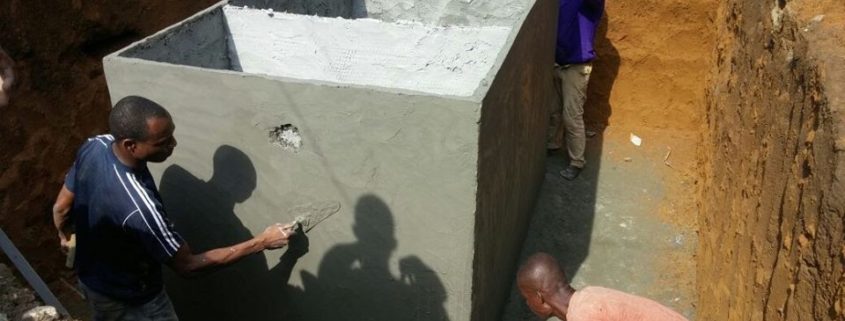2017 Quarter 1 Progress of SSD Project
Sanitation Service Delivery (SSD) aims to increase the use of sanitation and safe disposal of fecal waste by influencing the region’s sector to create a more effective, efficient and inclusive market for the urban poor in Benin, Cote d’Ivoire and Ghana.
Market Constraints
An urban sanitation market landscape analysis was completed in the three countries. This analysis identified the causes of market failures and intervention areas that would deliver the greatest impacts. During this analysis, a team assessed existing sanitation products and services, visited markets, and conducted interviews with producers, sales staff, and consumers. This was essential to gaining an understanding of market actors’ roles, expectations, incentives, behaviors, and financing options, and chokepoints in the supply chain. The following market constraints were identified in all three countries:
- Sanitation products perceived as expensive by low-income consumers;
- Lack of local manufacturing and installation capacity;
- Lack of affordable options for fecal sludge collection and storage;
- Mistrust between consumers and service providers, and lack of standards to influence performance;
- Low capacity of vacuum truck operators (VTOs) to completely empty tanks;
- Lack of finance for new VTO equipment; and,
- VTOs not earning sufficient margins.
Prototyping Improvements
In order to address these key market failures and create a more efficient, inclusive sanitation market for the urban poor, product and service delivery improvements were prototyped in Year 2. Prototypes included prefabricated septic tanks in Cote d’Ivoire; improved pit latrines in Benin; landlord finance models in Cote d’Ivoire and Benin; and interactive call centers to help optimize the work of VTOs. The team was also involved with the development of finance mechanisms to help business start-ups for entrepreneurs building toilets; the innovation of new sanitation technologies and services; and actionable learning to influence policy and practice at scale. The benefits of strengthening the enabling environment through better collaboration with the private sector and the development of regulatory frameworks has been advocated to municipal and national governments throughout the project.
Private Sector Scale-up
After testing these prototypes and service models, the team is now working with private sector entities, such as concrete manufactures and VTOs, to develop scale-up strategies for the prefabricated septic tanks in Cote d’Ivoire and offset pit latrines with SaTo pans in Benin. In Cote d’Ivoire and Benin, a call center is also being developed to improve the quality and reduce the cost of mechanized septic tank emptying. To accelerate toilet sales in Ghana, sales agents and artisans are being trained and community marketing events are being held. Ghanaian private sector entities are also helping the team introduce the pre-fabricated septic tanks that will be scaled-up in Cote d’Ivoire. In Kumasi, Ghana, the Clean Team is testing a mobile money model to reduce operations cost and increase profitability with support from SSD.
Recent Program Highlights
- Installation of first on-site pilot septic tank in Yopougon, Cote d’Ivoire using ferro-cement. Ferro-cement is a system of reinforced mortar applied over a layer of metal mesh attached to a grid of 6mm rebar. This technique creates a strong and light structure.
- GIS mapping of the latrine toilet and septic tank supply chains in the project districts of Cote d’Ivoire and Benin. This mapping facilitates an understanding of service provider distribution, which can be used to improve service coverage. When a gap is identified, such as if a concrete ring manufacturer is not located nearby, a local business is identified to fill the gap to minimize transportation costs.
- Implementation of pit latrines pilot phase using the SaTo pan as a user interface in 25 households in Abomey-Calavi, Benin.
- During the workshops with Ghanaian WASH sector stakeholders, it was recommended that more builders, craftsmen, and entrepreneurs should be recruited and trained. Addressing the insufficient number of skilled artisans in the market would improve program implementation.
SSD is a five-year, $15.8 million USAID/West African regional urban sanitation project launched in October 2014. SSD is implemented by Population Services International in collaboration with PATH and Water and Sanitation for the Urban Poor. Check out their recent progress on their Facebook page.





Leave a Reply
Want to join the discussion?Feel free to contribute!